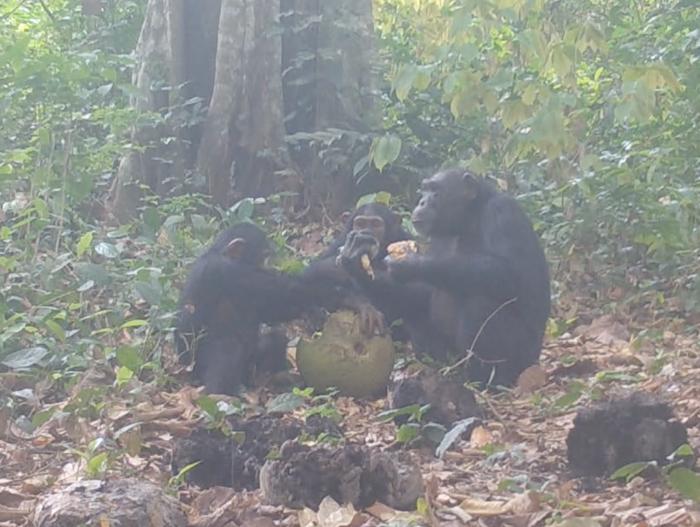
image:
Chimpanzees sharing fruit
view more
Credit: Bowland et al.
For the first time, wild chimpanzees have been pictured eating and sharing fruit containing alcohol.
A research team led by the University of Exeter set up cameras in Guinea-Bissau’s Cantanhez National Park.
Footage of chimps sharing fermented African breadfruit – confirmed to contain ethanol (alcohol) – raises fascinating questions about if and why chimps deliberately seek out alcohol.
Humans are believed to have consumed alcohol far back into our evolutionary history, with benefits for social bonding.
And the new study suggests our closest relatives might be doing something similar.
“For humans, we know that drinking alcohol leads to a release of dopamine and endorphins, and resulting feelings of happiness and relaxation,” said Anna Bowland, from the Centre for Ecology and Conservation at Exeter’s Penryn Campus in Cornwall.
“We also know that sharing alcohol – including through traditions such as feasting – helps to form and strengthen social bonds.
“So – now we know that wild chimpanzees are eating and sharing ethanolic fruits – the question is: could they be getting similar benefits?”
The researchers used motion-activated cameras, which filmed chimps sharing fermented fruits on 10 separate occasions.
Fruit shared by these chimps was tested for alcohol content. The highest level found was the equivalent of 0.61% ABV (Alcohol By Volume – a measure used in alcoholic drinks).
This is relatively low. But the researchers say it may be the “tip of the iceberg”, as 60-85% of chimps’ diet is fruit – so low levels of alcohol in various foods could add up to significant consumption.
The researchers stress that chimps are unlikely to get “drunk” – as this would clearly not improve their survival chances.
The impact of alcohol on chimps’ metabolism is unknown. But recent discoveries of a molecular adaptation that greatly increased ethanol metabolism in the common ancestor of African apes suggests eating fermented fruits may have ancient origins in species including humans and chimps.
“Chimps don’t share food all the time, so this behaviour with fermented fruit might be important,” said Dr Kimberley Hockings, also from the University of Exeter.
“We need to find out more about whether they deliberately seek out ethanolic fruits and how they metabolise it, but this behaviour could be the early evolutionary stages of ‘feasting’.
“If so, it suggests the human tradition of feasting may have its origins deep in our evolutionary history.”
To find out more about this research project, visit
Bowland’s work was funded by the Primate Society of Great Britain.
The paper, published in the journal Current Biology, is entitled: “Wild chimpanzees share fermented fruits.”
Journal
Current Biology
Article Title
Wild chimpanzees share fermented fruits
Article Publication Date
21-Apr-2025
Media Contact
Louise Vennells
University of Exeter
pressoffice@exeter.ac.uk
Office: 0044-139-272-2062
Journal
Current Biology
Article Title
Wild chimpanzees share fermented fruits
Article Publication Date
21-Apr-2025
Keywords
bu içeriği en az 2000 kelime olacak şekilde ve alt başlıklar ve madde içermiyecek şekilde ünlü bir science magazine için İngilizce olarak yeniden yaz. Teknik açıklamalar içersin ve viral olacak şekilde İngilizce yaz. Haber dışında başka bir şey içermesin. Haber içerisinde en az 12 paragraf ve her bir paragrafta da en az 50 kelime olsun. Cevapta sadece haber olsun. Ayrıca haberi yazdıktan sonra içerikten yararlanarak aşağıdaki başlıkların bilgisi var ise haberin altında doldur. Eğer yoksa bilgisi ilgili kısmı yazma.:
Subject of Research:
Article Title:
News Publication Date:
Web References:
References:
Image Credits:
Keywords



